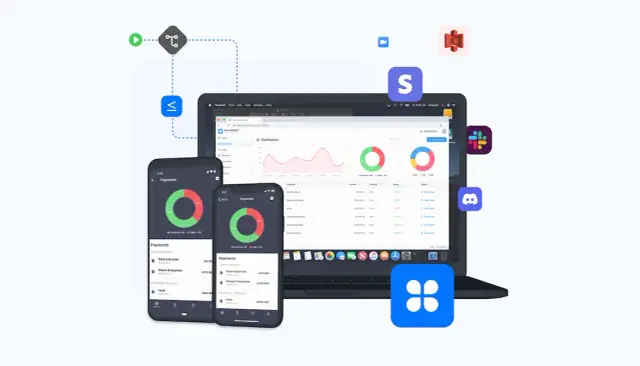The Ultimate Guide to Developing Clinic Management Software
Discover the essential features, latest trends, and best practices for developing clinic management software, and learn how no-code platforms like AppMaster can simplify the process.

Clinic management software is a comprehensive solution designed to streamline the daily operations of healthcare facilities and improve patient care. It helps clinics, hospitals, and medical practitioners manage administrative tasks, automate workflows, store patient records, and monitor financial transactions, among other critical functions.
With the increasing demand for efficient healthcare technology, the development of clinic management software has become a crucial area of focus for software developers and healthcare organizations. Effective clinic management software can drastically improve the performance of healthcare facilities, leading to higher patient satisfaction, reduced administrative burden, and more efficient business operations. In this article, we'll discuss the essential features to consider when developing clinic management software, highlight current trends in the industry, and offer insights into leveraging emerging technology for successful software implementation.
Essential Features for Clinic Management Software
A successful clinic management software solution must address the complex and varied needs of medical professionals, support staff, and patients alike. Here are some key features that any clinic management software should include:
Patient Information Management
An essential feature of any clinic management software is the ability to store and manage patient data. This includes basic information such as contact details, medical history, allergies, medications, appointment history, and billing details. Issues like data privacy and security, quick retrieval of information, and interoperability with other systems must all be considered when designing this feature.
Appointment Scheduling and Management
Efficient appointment scheduling is crucial for the smooth operation of any healthcare facility. Clinic management software should provide an easy-to-use interface that enables staff to schedule, modify, and cancel appointments, track patient visits and send reminders to reduce no-shows.
Electronic Health Records (EHR)
Electronic health records (EHR) are a crucial aspect of modern healthcare, facilitating the real-time, secure exchange of patient data among healthcare teams. Clinic management software should offer powerful EHR functionality, including inputting, accessing, and sharing patient data such as diagnoses, treatments, lab results, and prescription information.
Billing and Invoicing
A well-designed clinic management software solution must include comprehensive billing and invoicing capabilities to streamline the financial management process. This includes automated insurance claims processing, real-time payment tracking, and generation of customizable invoices and payment receipts.
Prescription Management
Prescription management is an important aspect of patient care, and clinic management software must easily create, track, and dispense prescriptions. Features to consider include drug interaction warnings, dosage information, and the ability to electronically transmit prescriptions directly to pharmacies.
Laboratory and Diagnostic Integration
Clinic management software should integrate seamlessly with other systems used in healthcare settings, such as laboratory and diagnostic equipment. This enables the automatic capture of test results, imaging data, and other diagnostic information directly into EHRs, enhancing both efficiency and accuracy.
Reporting and Analytics
An effective clinic management software solution should include powerful reporting and analytics features to enable administrators and medical professionals to track key performance indicators and identify areas for improvement. Customizable reports and dashboards and the ability to export data for further analysis should be key components of this functionality.

Current Trends in Clinic Management Software
As healthcare organizations strive to improve patient care and optimize operational efficiency, several trends are shaping the development of clinic management software solutions:
Telemedicine Integration
Telemedicine has become increasingly prevalent due to the COVID-19 pandemic. Clinic management software should support virtual consultations by integrating telemedicine capabilities, such as videoconferencing and secure messaging, to help healthcare providers deliver remote care effectively.
Artificial Intelligence (AI) and Machine Learning
AI and machine learning have immense potential to augment clinic management software with advanced features such as natural language processing for EHR input, predictive analytics for appointment scheduling, and advanced image analysis for diagnostic support.
Mobile Health App Integration
The growing adoption of mobile health apps for patient engagement, remote monitoring, and disease management presents opportunities for clinic management software to integrate with these applications. This can improve data collection and help healthcare providers tailor treatment plans more effectively based on real-time patient data.
Interoperability and Data Sharing
As healthcare becomes more complex, the need for better data sharing and interoperability between systems becomes critical. Clinic management software solutions should adhere to industry standards and regulations to ensure seamless exchange of patient data with other healthcare organizations, pharmacies, insurers, and government agencies.
Cloud-Based Deployment
Cloud-based clinic management software solutions offer numerous benefits, such as reduced hardware and maintenance costs, easier access to data, and better scalability. Software developers should consider cloud-based deployment options when designing their clinic management software solutions to meet the evolving needs of healthcare organizations and ensure optimal performance.
Best Practices for Developing Clinic Management Software
Effective clinic management software (CMS) can streamline operations, improve patient care, and enhance productivity. Following best practices is important when developing CMS to ensure the software meets your clinic's specific requirements. Here are some key best practices for developing clinic management software:
- User-centered design: Focus on the needs and preferences of end-users like doctors, nurses, and administrative staff. Involve them in the design and development phases, and consider their feedback to create an intuitive and user-friendly solution. Prioritize features that are most important to the users.
- Data security and privacy: Implement strong security measures such as encryption, secure access controls, and powerful authentication mechanisms to protect sensitive patient data. Ensure the software complies with healthcare data regulations such as HIPAA in the US, GDPR in Europe, and other regional regulations.
- Scalability: Design the CMS to accommodate future growth by building in scalability from the outset. Opt for a modular architecture that allows easy integration of additional features or enhancements as the clinic expands.
- Integration with existing systems: Ensure the CMS can seamlessly integrate with existing systems, such as electronic health records (EHRs), laboratory information systems (LIS), and pharmacy management systems (PMS). This not only streamlines operations but also helps avoid data silos and duplication of effort.
- Customization and flexibility: Every clinic has unique requirements, so a one-size-fits-all approach may not be the best solution. Develop the CMS to be easily customizable and adaptable to diverse processes and workflows within the clinic.
- Comprehensive testing: Rigorously test the CMS for functionality, usability, security, and performance. Identify and fix any issues before deploying the software in a real-world clinical setting.
- Continuous updates and improvement: Remain proactive in maintaining the software by providing regular updates and introducing new features based on user feedback and emerging industry trends.
Leveraging No-Code Platforms like AppMaster
In an era where time-to-market and cost efficiency are crucial, no-code platforms offer a viable solution for developing clinic management software while adhering to best practices. One such no-code platform is AppMaster, which allows you to create web, mobile, and backend applications without writing any code.
AppMaster is a comprehensive no-code platform that speeds up application development and slashes costs by enabling even non-technical users to develop and deploy clinic management software. Here's how AppMaster can help simplify the development process:
- Visual design tools: Design a custom user interface using drag-and-drop components, simplifying the design process and making it more intuitive.
- Automated backend development: With AppMaster, you can build backend applications, create data models, and design business processes without coding. This speeds up development and ensures that the software is scalable and optimized for specific workflows.
- API integration: AppMaster facilitates seamless integration with existing systems and third-party applications through its API management capabilities.
- Access to source code and binary files: Depending on the AppMaster subscription plan, you can access executable binary files, or even source code, enabling further customization and control over your clinic management software.
- Eliminating technical debt: By regenerating applications from scratch whenever requirements change, AppMaster eliminates technical debt and ensures that the software remains up-to-date and relevant.
- Cost-effective pricing plans: Choose from various pricing plans to suit your clinic's needs, from small businesses and startups to large enterprises.

By leveraging a no-code platform like AppMaster, you can substantially reduce development time, lower costs, and improve the quality of your clinic management software.
Evaluating Costs and Benefits of Custom Clinic Management Software
Developing custom clinic management software requires a thorough cost-benefit analysis to ensure the investment pays off. When evaluating the costs and benefits of a custom CMS, consider the following factors:
- Initial development costs: Assess the cost of developing the CMS, including software development, integrations, and training.
- Ongoing maintenance costs: Calculate the ongoing costs of maintaining and updating the CMS, such as software updates, bug fixes, and server maintenance.
- Customization and scalability: Determine the benefits of having a tailored solution that can accommodate your clinic's unique requirements and accommodate growth.
- Time savings: Estimate the potential time savings from increased efficiency and streamlined workflows.
- Improved patient care: Assess the potential benefits of more accurate data management, better appointment scheduling, and improved communication between healthcare providers.
- Regulatory compliance: Consider the cost savings achieved by ensuring compliance with healthcare data regulations, avoiding fines, and reducing the risk of data breaches.
- Reduced administrative burden: Analyze the potential reduction in administrative resources and related costs due to streamlined processes and better resource allocation.
- Risk mitigation: Evaluate the potential risks of continuing to rely on manual processes or legacy systems and weigh them against the risks associated with a custom CMS implementation.
By carefully analyzing the costs and benefits of custom clinic management software, you can decide whether it's the right solution for your clinic.
Developing an effective clinic management software solution requires adherence to best practices, a user-centered approach, and a focus on data security and privacy. Leveraging no-code platforms like AppMaster simplifies the development process by providing quick and cost-effective methods for delivering custom CMS solutions that meet the unique requirements of your clinic. Conducting a thorough cost-benefit analysis can help you make informed decisions about investing in custom CMS development for your clinic.
FAQ
Clinic Management Software (CMS) streamlines healthcare operations for clinics and hospitals, covering patient scheduling, billing, record management, and more.
Custom CMS aligns precisely with a healthcare provider's needs, offering flexibility and scalability compared to off-the-shelf solutions.
The essential features of Clinic Management Software include patient scheduling, EHR management, billing and invoicing, inventory control, reporting and analytics, telehealth integration, and security measures to protect patient data.
Yes, healthcare software must adhere to various regulations and standards, such as the Health Insurance Portability and Accountability Act (HIPAA) in the United States.
No-code and low-code platforms like AppMaster can significantly expedite the development of Clinic Management Software. These platforms allow developers to create customized solutions without extensive coding, making the development process faster and more accessible.
Clinic Management Software enhances efficiency by automating administrative tasks, reducing paperwork, and minimizing errors in billing and record-keeping. This streamlines operations, allowing healthcare providers to focus more on patient care.





